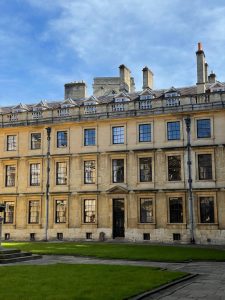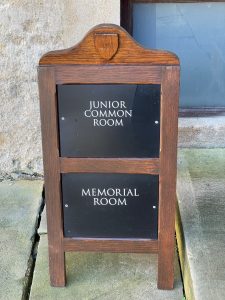Another friend, C, when I am telling her about reading Peter Ackroyd’s ‘The English Ghost’, reminds me that there are things which can’t be explained.
Thinking about ghosts a lot this weekend as I return to my old college. Ridiculously beautiful place, Queen’s College, Oxford. I walk around front and back quad looking up at windows, longing to see a lost face looking back out at me.  Front and back quad full of memories, full of ghosts. Memories are ghosts. Memories as ghosts. Many objects don’t get to have ghosts because how we make them now, they cannot die. Jesse Darling, in his Turner Prize short film, talks about how we have interrupted the organic cycle of life, death and decay by our invention and widespread use of plastics. “The Zombie Apocalypse is now”. We rhapsodise together about the beauty of heaps of unwanted rubbish to be seen everywhere now, the elegiac qualities of all this ‘stuff’, which I also am fond of photographing.
Front and back quad full of memories, full of ghosts. Memories are ghosts. Memories as ghosts. Many objects don’t get to have ghosts because how we make them now, they cannot die. Jesse Darling, in his Turner Prize short film, talks about how we have interrupted the organic cycle of life, death and decay by our invention and widespread use of plastics. “The Zombie Apocalypse is now”. We rhapsodise together about the beauty of heaps of unwanted rubbish to be seen everywhere now, the elegiac qualities of all this ‘stuff’, which I also am fond of photographing.
It is so quiet. No city centre sounds intrude into this enclave through or over its walls. It is and was an ivory tower. A bird’s call asserts itself. I become aware of a crow perched on top of the clock tower. I video it, pointing the camera straight into the sun, which becomes a cool white disc on the screen and the crow, black anyway, silhouetted there. A plume of steam rises up from a vent in the ceiling of the building, efficient college kitchen extraction systems. A wooden ‘A’ board gives directions to a ‘Memorial Room’. A room where we go to remember.
Processing experiences
I think about Annie Ernaux, her life’s work, remembering. Writing as excavation of memories. I am very aware of overwhelm in myself and realise I can go with rather than against that. A great garbage-patch of refuse floating on the oceans is what I feel I am dealing with. Which I cannot hope to cope with. It’s all bobbing around in my head, in my body, in my nervous system. All of it, everything that ever happened to me to my family. The incommensurability of history. I did write about this a bit when I was trying to write fiction. Perhaps I should go back and revisit that?
But also overwhelm as bounty of richness. The complete appropriateness and relevance of all this to everything that I have been working on and towards for nigh on forty years. Like trying to digest the biggest and best feast ever. Childish glee. An abundance of that. The bun dance of life. Jumping up and down with happiness. Feelings that can’t be expressed because they are pure child and don’t find any place in the adult world, certainly not in this world, as it is, with all its evils and misdemeanours.
Aware that I am creating all this ‘stuff’ in this writing, that is extra, excess, to the work itself. Wanting to keep the levels of ‘stuff’ down, not to write too much but there is so much to deal with. Too much material.
Bring this into the work. In such a way that it can be dealt with. Or not.
AE (same initials as Auto Ethnography) deals with one incident at a time, which overlap across different texts in echoes of re-mentions, creating the palimpsest which is the body of her work. Elegantly done, suggestive of self-control and focus. AE as only child (the sister who came before having died aged six), no siblings, and so freer to tell her experience. My self-perceived blocks on my right to speak as the youngest of four. Even to know if any of my experiences were really mine to claim as my own. Or told to me after the event, as their version, in their words.
